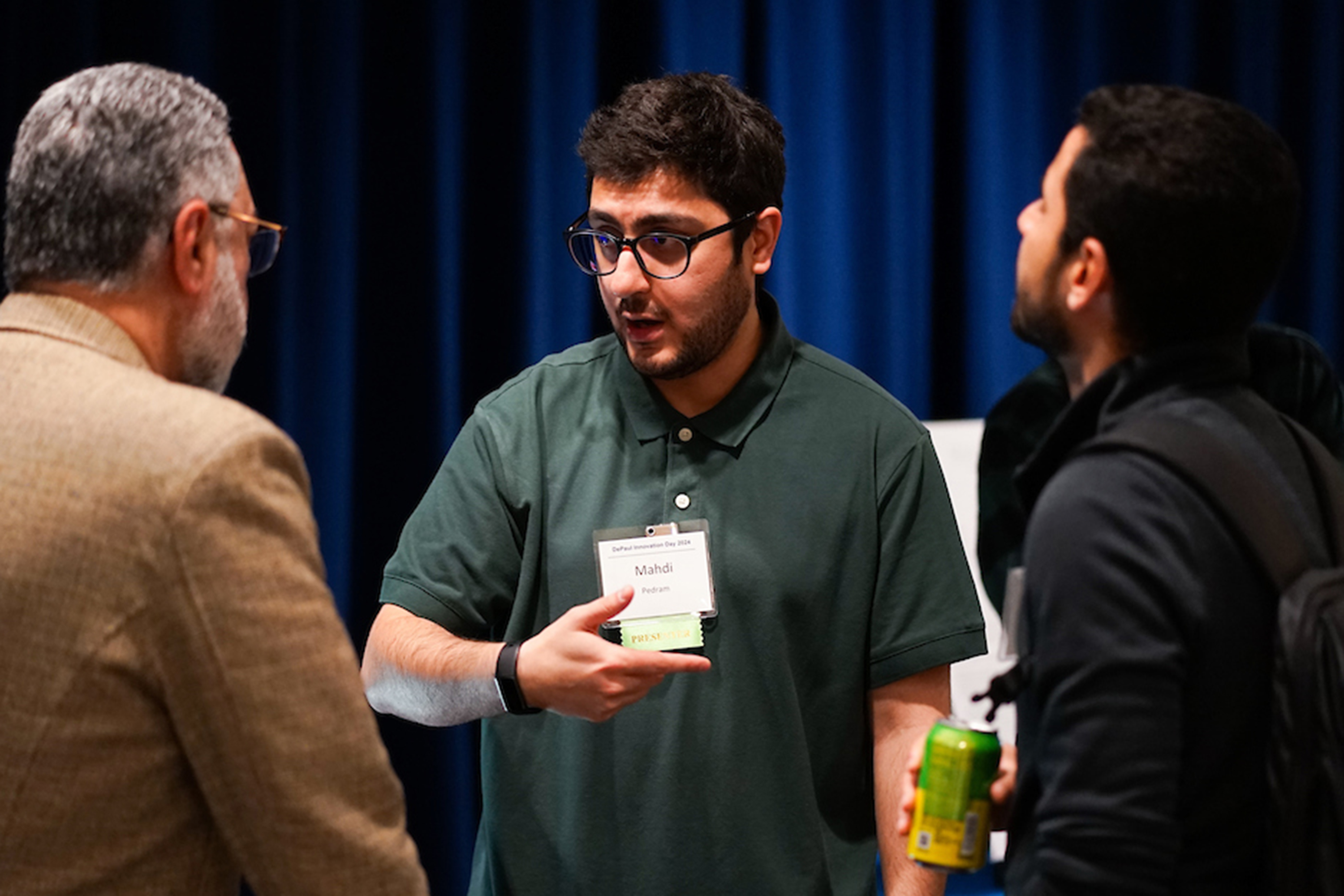 Thiru Ramaraj (right) is among the DePaul faculty collaborating with Rosalind Franklin faculty on innovative projects that combine AI and biomedical discovery. (Photo by Shua Soares/DePaul University)
Thiru Ramaraj (right) is among the DePaul faculty collaborating with Rosalind Franklin faculty on innovative projects that combine AI and biomedical discovery. (Photo by Shua Soares/DePaul University)
Malaria, cigarette smoking and septic shock kill millions of people every year. In a fresh round of funding,
DePaul University and Rosalind Franklin University of Science and Medicine are supporting faculty research projects that bring together artificial intelligence and biomedical discovery to address these health care challenges. The grants, totaling a combined $200,510, launch research among interdisciplinary teams, which include robotics experts, computer engineers, a biophysicist, a psychologist and an immunologist.
"We are impressed with the vision these teams have developed for their collaborative research projects," says Daniela Stan Raicu, associate provost for research at DePaul. "Together, faculty from DePaul and Rosalind Franklin have the potential to make an incredible impact on human health through these advances in artificial intelligence."
“These grants and the teams receiving them provide more evidence of the critical advances emerging from the RFU/DePaul collaboration,” says Ronald S. Kaplan, executive vice president for research at Rosalind Franklin. “Hundreds of millions of people worldwide stand to benefit from biomedical research like this, and RFU looks forward to continuing our DePaul partnership and driving these projects to fruition.”
The first project uses automated systems and physiology to address issues in managing sepsis and septic shock. Another will incorporate AI via a wearable wrist-worn device to analyze cigarette smoking behaviors. The third project will combine machine learning and immunology to determine the effectiveness of malaria prevention therapies.
Automated systems, physiology combine to aid sepsis management
Sepsis, severe sepsis, and septic shock are the body’s extreme response to an infection and are life-threatening conditions. According to the Center for Disease Control and Prevention, one in three people who dies in a hospital had sepsis during that hospitalization.
Muhammad Umer Huzaifa, an associate professor in DePaul’s School of Computing, hopes to develop an automatic system that will aid the management of sepsis in a patient’s blood and ultimately save lives.
The project uses overlapping closed-loop systems and interlocked controllers that optimize the delivery of fluids and medicines to maintain blood flow until the inflammatory response resolves. Huzaifa will team with Raúl Gazmuri, a professor of medicine and director of the Resuscitation Institute at Rosalind Franklin, which aims to improve the outcomes of those who have suffered cardiac arrest.
 Mahdi Pedram presents during Innovation Day 2024. His collaborative grant will track cigarette smoking behavior. (Photo by Shua Soares/DePaul University)SmokeSense: Using AI for real-time insights
Mahdi Pedram presents during Innovation Day 2024. His collaborative grant will track cigarette smoking behavior. (Photo by Shua Soares/DePaul University)SmokeSense: Using AI for real-time insights By incorporating cutting-edge AI technologies,
Mahdi Pedram in DePaul’s School of Computing aims to develop a privacy-conscious, wrist-worn device called SmokeSense to passively detect and track real-time cigarette smoking behaviors.
“SmokeSense emerged from a critical examination of the challenges faced in smoking cessation efforts,” says Pedram, who teaches AI and computer systems. “We recognized traditional methods for monitoring cigarette use, such as self-reporting or relying on retrospective data, were fraught with inaccuracies and compliance issues. We took this opportunity to leverage advancements in technology to create a more accurate, non-invasive and user-friendly solution.”
Pedram will collaborate with Nancy Jao, a clinical psychologist and director of the Health, Behaviors, and Tobacco Use Research Lab at Rosalind Franklin. The project will apply precise sensors to distinguish hand-to-mouth motions and air-based chemical compounds to detect cigarette use. AI integration will also seek to enhance user awareness by providing instant alerts and feedback upon detection of cigarette use. The team’s long-term goal is to develop improved, “just-in-time” interventions for smoking cessation.
“By enhancing the accuracy and ease of smoking monitoring, SmokeSense has the potential to contribute significantly to public health efforts in reducing the prevalence of smoking and its associated health risks. Ultimately, our goal is to see a significant reduction in smoking-related diseases and deaths, aligning with the National Cancer Institute's Tobacco Control Research Priorities,” Pedram says.
Using machine learning to enhance anti-malarial immune response
A mosquito-borne disease, malaria can cause severe illness and death in just 24 hours if left untreated. The disease resulted in at least 200 million clinical cases and 627,000 deaths globally in 2020 alone. Despite the body’s well-orchestrated immune response to the disease, naturally acquired immunity to malaria offers limited protection. Previously, there has been little investigation into this paradox.
Thiru Ramaraj, an assistant professor of bioinformatics in DePaul’s School of Computing, will use machine learning to predict the prognosis of malaria patients. Ramaraj’s project utilizes research from Rahul Vijay, an assistant professor of microbiology and immunology at Rosalind Franklin.
“We believe machine learning approaches will help identify biomarkers in malaria that may act as key targets to improve prognosis and contribute to the diagnosis and treatment of malaria," Ramaraj says. “We hope this collaboration will generate important preliminary results that can be used to obtain additional funding from the National Institutes of Health.”
Learn more about grants at DePaul on the
Office of Research Services website.